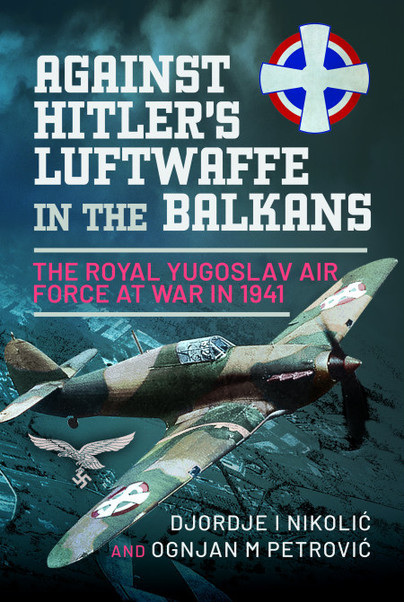Against Hitler's Luftwaffe in the Balkans (ePub)
The Royal Yugoslav Air Force at War in 1941
Imprint: Air World
File Size: 54.1 MB (.epub)
Pages: 232
ISBN: 9781399088985
Published: 20th September 2023
| Other formats available - Buy the Hardback and get the eBook for £1.99! | Price |
|---|---|
| Against Hitler's Luftwaffe in… Hardback Add to Basket | £18.75 |
Immediately following the end of the First World War, the air force of the newly-formed Southern Slav State, the Kingdom of Serbs, Croats and Slovenes, was forced to rely mainly on war-time Serbian Air Service aircraft and material left after the withdrawal of the French Armée de l’Air from the Balkans in 1919/1920. This equipment was supported by the addition of French war surplus stocks which started arriving in 1921.
In 1929 the monarchy changed its name to the Kingdom of Yugoslavia. Then, from 1930, the official name of the air service branch its military was changed to what is commonly known in the West as the Royal Yugoslav Air Force (RYAF). The obsolete First World War aircraft were replaced from 1925 onwards by stop-gap solutions purchased mainly from France, some from the Czechoslovakian Republic as well as from the first domestic factories.
From 1936, the RYAF again began to reorganize and modernize, with the purchase of the most modern aircraft available at that time. These aircraft were imported from the UK, Germany and Italy, some being built under licence in domestic factories. During this period the Kingdom of Yugoslavia succeeded, as much as conditions allowed, to equip its air force with the most advanced fighter and bomber types of the period.
For the Kingdom of Yugoslavia, the Second World War started on 6 April 1941. The military coup d’etat of 27 March 1941 and anti-German demonstrations in Belgrade clearly aligned the kingdom with the Allies. That same day, Hitler ordered the implementation of Unternehmen 25 (Operation 25) – the attack against Kingdom of Yugoslavia. Hitler had also secured Mussolini’s support for this campaign, while Hungary, Romania and Bulgaria gave active or passive backing in exchange for territorial claims in Yugoslavia.
Despite all the odds, the airmen of the RYAF fought gallantly in the defence of their homeland, with fighters taking on the German and Italian bombers and their escort fighters – including the Axis types in service with the RYAF.
Eventually, due to the deteriorating situation on the front and the ever-increasing risk of the king and his government being captured, the decision was taken to evacuate by air to Greece. In the summer of the 1941 some 220 Yugoslav aviators gathered in Egypt and continued the fight against Axis, this time in the colours of the RAF. This is the full story of their service and combats in the early months of that year.
“The extraordinary photographs of aircraft, personnel, and facilities set this book apart.”
The Journal of the Air Force Historical Foundation
“Enjoyed it.”
The Historical Miniatures Gaming Society
Read the full review here.
"With around 250 monochrome photographs, many of which I suspect will be appearing for the first time in an English-language publication, together with a detailed text, this book provides a fascinating insight to a largely overlooked aspect of Second World War aviation."
The Aviation Historian - Issue 48
About Djordje I Nikolić
DJORDJE NIKOLIC was born in Belgrade, Serbia, coincidentally on National Aviation Day. Since early childhood he has been fascinated by all aviation-related matters, always staring up in the sky and regularly visiting aviation themed museums across Europe. His interests are primarily in the Royal Yugoslav Air Force and the history of Belgrade in the period between the two world wars and his collection includes hundreds of original photographs, documents, pilot logbooks and other memorabilia. Djordje graduated in mechanical engineering from the University of Applied Sciences in Aachen, Germany. Having completed his studies in the German language, he was able to research and interpret historical documents relating to the German aircraft in Yugoslav service in the interwar and Second World War period. He is also an avid aircraft modeler and regularly attends local and national shows and contests. Djordje currently resides in Washington State, USA.
About Ognjan M Petrović
OGNJAN PETROVIĆ was born in Kruševac, Serbia. He graduated in mechanical engineering and has worked for 30 years at the Development bureau of the ‘Process equipment’ factory in Kruševac at various design related activities. In 1968 he began researching history of Serbian and Yugoslav aviation and starting in 1982 he published his first articles and drawings in both domestic and international aviation magazines. He has authored over 1200 technical drawings and color profiles of Serbian and Yugoslav aircraft and has written over 160 scientific, research and historical articles. Additionally, he has illustrated numerous books and articles for fellow authors and has co-authored several aviation books. Also, he was the author of several aviation history exhibitions and catalogues. Ognjan currently resides in Kruševac, Serbia.















